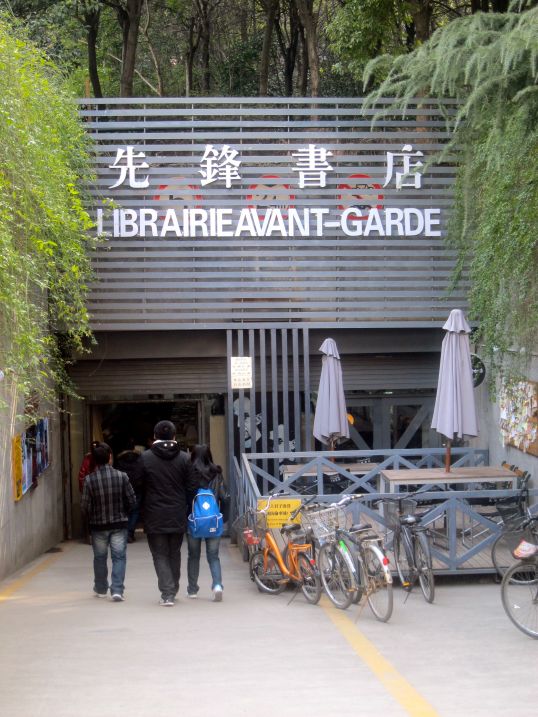Nanjing’s Literary Underground
Since I’m teaching literature classes, one of the puzzles that I’ve been trying to work out in Nanjing has to do with how Chinese students relate to books. I asked an Americanist colleague (a Chinese woman) from my department here at Nanjing Normal University how she usually handled classroom assignments, since there’s no campus bookstore and no one asked me in advance about whether I’d be using any textbooks in particular She replied that American literature textbooks were just too expensive, and after all, she went on, isn’t all of the old American stuff available on the Internet? She said that she typically just lists on the syllabus a bunch of books that students ought to read, and then she makes the occasional photocopy of an American literary text for the students to read.
My overall impression, which I’ll have to confirm by observing a few Chinese teachers of American literature in action, is that Teacher does pretty much all the talking and Students do a lot of listening to Teacher talk about Literature. My students said on the first day of class that in China the Teacher is customarily on a par with other important deities and thus is treated with a commensurate level of respect and awe. Why own books or bring books to class, if the Teacher will explain the reading to the class comprehensively — and without real discussion — and expect plenty of Teacher echoes around final exam time.
Nevertheless, with a little detective work it’s possible to uncover a world of serious readers and books in Nanjing City. Just around the corner from our apartment is a place called the Librairie Avant-Garde, and a remarkable place it is. For one thing, the Librairie has brilliantly solved the South China problem of no central heating in its buildings. The good Librairians have chosen to locate their massive bookshop in a converted underground parking garage. This way, once you’re underground and out of the weather the temperature evens out to a cool 60 degrees F or so: much more temperate than most other large buildings. Summertime will be equally cool underground the bustle of Nanjing.
It’s a huge bookstore and probably one of the largest I’ve ever seen, and it’s distinguished by the enormous number of pirated editions of all kinds of books. The stacks and aisles sort of approximate what Google Books would be like if all that stuff on line was actually started to get reprinted. With no royalties to any of the authors, of course, which is why the prices were all quite low. About 98 percent of the stuff for sale here is in Mandarin Chinese, of course, but the groaning shelves also feature loads of cheap but poor quality English translations. In fact, there are plenty of American texts as well, as long as you — like me — are partial to the great classics of the nineteenth century (Melville and Twain and Dreiser seem popular here, or at least they are popular with American Lit professors in China).
Modern English language books don’t seem very popular at all, and I’m not sure why, but it may be that the average Chinese who reads a bit of English just doesn’t have enough skill at the language to wrestle with English language books untranslated. There’s a strong push to have everyone in China learn English, as so many have hastened to remind me, but it’s tough to accomplish when most of the English language teachers in the Chinese schools are themselves rather unskilled at English (although not as unskilled as I am at Mandarin Chinese!). I’m finding that my best graduate students, who of course are English majors, are quite a bit stronger at English conversation than are many of their teachers. It’s probably no accident that there weren’t many folks in the Librairie Avant-Garde who were over 35 years of age.
So literary culture — we might even call it an incipient cafe culture — evidently thrives in places like this Chinese bookstore, which was filled with latte sipping book nerds, just like any good college bookstore back in the USA. There was ample space for study, and lots of folks were elbow-to-elbow doing exactly that while we toured the shop. Most of these readers were undoubtedly from the neighborhood, since the bookshop is located right between Nanjing University and NNU. Clearly, there’s no shortage of students to fill these wide aisles, and in fact the semester’s only a few weeks old and so there are still plenty of required books to buy, or at least consider buying. So there was lots of room for browsing and schmoozing, and there was a most pleasant and spacious lecture space set up for authors to read from their works, and there was a righteous coffee shop in the Librairie Avant-Garde as well, with cozy booths available for whiling away the day. Thus, more or less a larger version of our own Starbucks combined with a large bookstore but much further underground and helpfully insulated from the tremendous bustle, noise, congestion, and pollution of Nanjing’s street scene.
In a rare and clever Chinese reader’s oasis like this one, just about everything’s right about the literary world. You can browse the crisply pirated books, hear yourself think, plan the week’s reading and writing, and watch like-minded others do the same for themselves.



